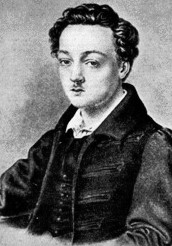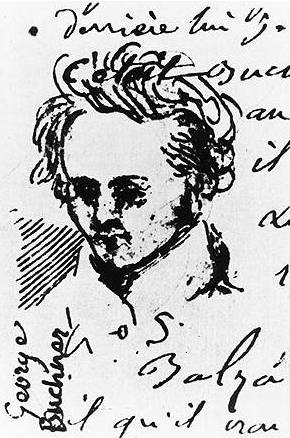Georg Büchner facts for kids
Georg Büchner (born October 17, 1813 – died February 19, 1837) was a German playwright and writer. He was the brother of the doctor and philosopher Ludwig Büchner. Many people think he could have become as important as famous writers like Johann Wolfgang von Goethe and Friedrich Schiller if he had lived longer.
Contents
Early Life and Studies
Georg was born in Goddelau, near Darmstadt, in a place called Hesse-Darmstadt. His father was a doctor. Georg went to a school where he learned Latin, Greek, and other languages like French, Italian, and English. However, he was most interested in science. He later went to university to study medicine in Strasbourg.
Political Ideas and Activism
In 1828, Georg became very interested in politics. He joined a group that later became known as the "Society for Human Rights" in Gießen and Darmstadt. In Strasbourg, he studied not only medicine but also French literature and political ideas.
While continuing his studies in Gießen, Georg started a secret group that wanted big changes in society. With the help of a Protestant theologian named Friedrich Ludwig Weidig, he published a leaflet called Der Hessische Landbote. This was a revolutionary text that pointed out social problems in the Grand Duchy of Hesse.
The authorities accused them of serious crimes against the government. Weidig was arrested and later died in prison. Georg, however, managed to escape across the border to Strasbourg. There, he wrote most of his plays and translated two plays by Victor Hugo. Two years later, his scientific paper on the nervous system of a fish was published. Ideas from thinkers like François-Noël Babeuf and Claude Henri de Saint-Simon greatly influenced his work.
Later Life and Legacy
In October 1836, Georg got a job at the University of Zürich as a teacher of anatomy. He moved to Zürich and spent his last months writing and teaching. He died of typhus when he was only twenty-three years old.
Important Literary Works
In 1835, Georg's first play, Dantons Tod (Danton's Death), was published. It was about the French Revolution. After that came Lenz, which was a short novel based on the life of a poet named Jakob Michael Reinhold Lenz.
In 1836, his second play, Leonce and Lena, was published. This play described the lives of the nobility. His most famous play, Woyzeck, was unfinished. It was special because its main characters were ordinary working-class people. This play was published after Georg's death. It later became the basis for Alban Berg's opera Wozzeck, which was first performed in 1925.
By the 1870s, Georg Büchner was almost forgotten in Germany. But then, Karl Emil Franzos edited his works. These works later became very important for new styles of writing, like naturalism and expressionism. A writer named Arnold Zweig even called Lenz, Georg's only novel, the "beginning of modern European prose."
Images for kids
-
Gravestone of Georg Büchner on Germaniahügel in Zürich-Oberstrass
See also
 In Spanish: Georg Büchner para niños
In Spanish: Georg Büchner para niños
 | Kyle Baker |
 | Joseph Yoakum |
 | Laura Wheeler Waring |
 | Henry Ossawa Tanner |




